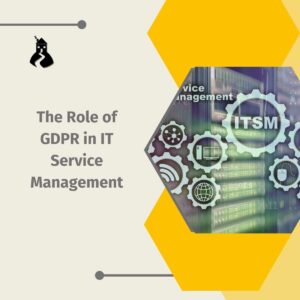
What is GDPR?
Regulatory Compliance is a concern for businesses worldwide. The purpose of the General Data Protection Regulation (GDPR) is to safeguard individuals’ privacy rights and regulate the handling of personal data. While compliance extends across various facets of an organisation, its impact on IT Service Management (ITSM) is often overlooked
Understanding the Intersection Between GDPR and ITSM
ITSM encompasses the strategies, processes, and tools used by organisations to design, deliver, manage, and improve IT services. It ensures the smooth functioning of IT operations, resolving incidents, and managing service requests. GDPR, on the other hand, mandates stringent requirements for the processing and protection of personal data. At first glance, they may seem distinct, but they intersect in numerous ways:
- Data Handling and Processing: GDPR imposes strict guidelines on how organisations collect, store, and process personal data. This necessitates robust data management practices within ITSM frameworks to ensure compliance. ITSM processes, such as incident management and change management, must align with GDPR principles to mitigate the risk of data breaches and non-compliance.
- Incident Response and Breach Management: GDPR mandates prompt and transparent reporting of data breaches to relevant authorities and affected individuals. ITSM plays a vital role in helping incident response and breach management activities. It enables organisations to identify and address security incidents swiftly, minimising the impact on data subjects and mitigating regulatory penalties.
- Service Request Handling: GDPR grants individuals various rights concerning their personal data, including the right to access, rectify, and erase their information. ITSM processes, such as service request management, must accommodate these rights to ensure compliance. Effective ITSM tools can streamline the handling of data subject requests, helping prompt responses and keeping audit trails.
- Compliance Monitoring and Reporting: GDPR requires organisations to implement measures for ongoing compliance monitoring and reporting. ITSM solutions equipped with robust reporting and analytics capabilities play a crucial role in this regard. They enable organisations to track key compliance metrics, generate audit reports, and prove adherence to GDPR requirements during regulatory assessments.
The Benefits of Compliant ITSM
While achieving GDPR compliance in ITSM may pose challenges, it also offers significant benefits:
- Enhanced Data Security: By aligning ITSM processes with GDPR standards, organisations can strengthen data security measures and minimise the risk of data breaches. This fosters trust among stakeholders and protects the organisation’s reputation.
- Improved Incident Response: GDPR-compliant ITSM enables organisations to respond swiftly and effectively to security incidents and data breaches. This proactive approach reduces the impact on data subjects and helps mitigate regulatory penalties.
- Streamlined Compliance: Integrating GDPR requirements into ITSM frameworks streamlines compliance efforts and reduces administrative burden. Organisations can leverage ITSM tools to automate compliance-related tasks, such as data subject request handling and breach notification, enhancing efficiency and accuracy.
- Demonstrable Accountability: Compliant ITSM solutions provide organisations with the means to prove accountability and transparency in their data processing activities. Robust audit trails and reporting capabilities enable organisations to showcase their commitment to compliance during regulatory audits and inquiries.
GDPR compliance is integral to effective IT Service Management in today’s regulatory landscape. By integrating requirements into ITSM frameworks, organisations can bolster data security, improve incident response capabilities, streamline compliance efforts, and prove accountability to regulators and stakeholders. Embracing the intersection of GDPR and ITSM is not merely a regulatory obligation but a strategic imperative for safeguarding data privacy and fostering trust.
Click on the button below to find out more about our GDPR compliant ITSM solution.





